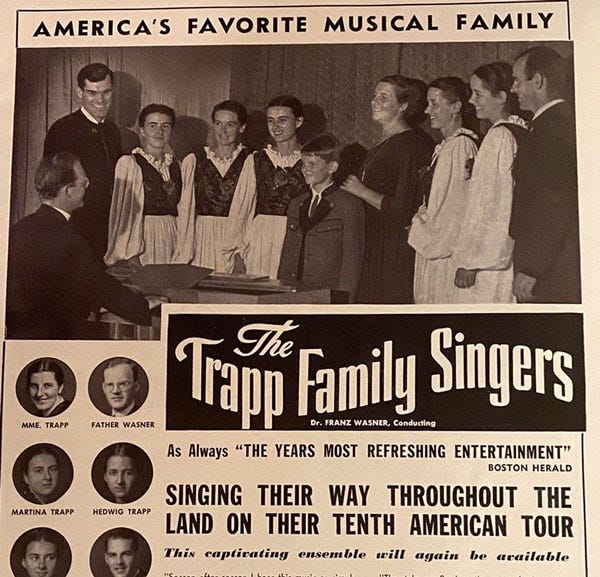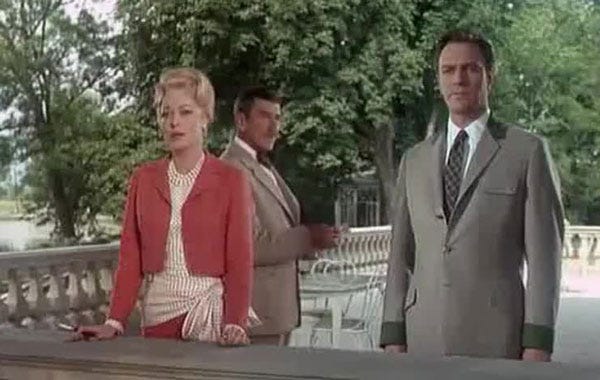Is Retreat a Form of Resistance?
The Sound of Music, the von Trapp family, and living in Trump's America
Welcome to another edition of Willoughby Hills!
I recently shared that I need to slow the pace of writing this newsletter, only writing when I feel inspired and have the time, rather than sticking to an arbitrary publishing schedule. Today is one of those times I feel inspired and have the time. I hope this will help bring you some clarity.

Perched in the Green Mountains near Stowe, Vermont, there’s a wonderful lodge that can transport you to another place. The Trapp Family Lodge has been welcoming guests since the 1950s, with the current structure dating to the 1980s.
While the lodge firmly rests on American soil, there’s a spirit to the place that feels distinctly European, specifically Austrian.
The building features beautiful wood beams, joined together with wooden pegs. There are intricate wooden radiator covers keeping the building warm and carved wooden chairs and headboards in the rooms.
The breakfasts are of the European variety, with hard-boiled eggs, cured meats, and sliced cheeses served alongside American classics like bacon, scrambled eggs, and toast. There’s an on-site brewery which serves Austrian style beers on tap along with sausages and homemade mustards.
Gazing out at the snow-capped mountains, as I did on a family trip in the early spring of 2018, it’s easy to feel transported to the Alps. And that’s actually the whole point.
The “Trapps” of the Trapp Family Lodge are actually the descendants of Georg von Trapp, an officer in the navy of the Austro-Hungarian empire and father to ten children. His family’s story was the basis for the Broadway musical and 1965 film adaptation The Sound of Music.

Naval work was in Georg’s blood. He was born in 1880 to a knighted naval commander. He entered the Naval Academy at the age of fourteen, eventually rising to the rank of captain and being decorated with the title “Baron.”
As anyone knows from history (or from viewing The Sound of Music), the politics in Austria began to change in the late 1930s. According to the book The World of the Trapp Family by William Anderson:
“On March 11, 1938, the inevitable happened. Nazi boots marched into Austria, and the country was annexed by Germany. Hitler announced the Anschluss (union) of Austria and Germany. As the von Trapps sat listening to the radio in the library at home, they heard bells pealing from every church in nearby Salzburg. The Captain called the police to find out what was happening, and learned that the Nazis had moved into Salzburg. The bells were ‘welcoming’ the conquerors.
‘We are standing at the open grave of Austria,’ Captain von Trapp remarked of the propaganda techniques and tactics used by the Nazis. Although it was best to stay silent about one's beliefs, the von Trapps remained steadfast in their loyalty to the old Austria.”
The Nazis had special plans for the decorated von Trapp family, as Maria von Trapp (Georg’s second wife) recounted in the same book:
"‘They offered my husband [Georg] the command of a German submarine. To our eldest son, Rupert, who was just out of medical college and had barely served his internship, they offered a post as head of one of the great Vienna hospitals. Such a position with its handsome salary would have made it possible for him to support a wife and a home. But we knew that the job they wanted to give Rupert was a job taken from a Jewish doctor, and that if my husband had served the Nazis it would be a compromise with all the ideals that meant so much to us. There was not an instant's doubt in any of our minds. Exile and persecution would be preferable.’"
The von Trapp family quietly left Austria, although they didn’t dramatically “Climb Every Mountain” as shown in the movie. Rather, they first fled to Italy, where their Italian passports (a relic of how territories were realigned after World War I) allowed them some refuge from Nazi control. They eventually boarded a ship in England bound for the United States. The family arrived in New York, unable to speak English and with only four dollars between them.
The von Trapps had already made a name for themselves as singers, traveling throughout Europe as a singing group. Upon arriving in America, they found similar success. Their act featured many Austrian songs, with the family wearing traditional Austrian dress. They became a sensation, touring not only America but around the world!

Eventually, the family settled in the Green Mountains of Vermont and sought to establish a bit of Austria with their lodge business and brewery.
The story of the von Trapps were on my mind lately as I have been wrestling with how best to resist this incoming administration.
Like many people, I didn’t watch the Inauguration. Because it fell on Martin Luther King Jr. Day, my kids were home from school. We had also just received a fresh blanket of snow the night before, our first substantial snowfall this winter. I spent the day clearing the cars and driveway and doing other projects around the house. I took our dog for a walk in the woods as the sun was getting low in the sky. It was glorious!
That evening, after avoiding any kind of media all day, I began to scroll social media and see the deluge of executive orders that Trump enacted in his first hours in office. Some were meant to do immediate and lasting harm to the most vulnerable Americans, like ending birthright citizenship.
Others were mostly symbolic, meant to enrage people like me: renaming Denali to Mount McKinley, declaring the Gulf of Mexico the “Gulf of America,” and pardoning the January 6 rioters including leaders of the Proud Boys and Oath Keepers. I could feel the anxiety swelling in my stomach, the anger and rage that was so familiar four years ago.
And then I checked myself. Most of these initial actions are meant as a distraction, they’re meant to keep our eyes off of the real corruption and the real harm being done. Endlessly debating whether or not Elon Musk made a Nazi gesture is the whole point- it enrages the left, energizes the right, and keeps us all from talking about anything of substance.
I took a breath and took those distractions for what they are, distractions. I thought of The Four Agreements and vowed not to take Trump’s actions personally. I will need to continue to do this to survive the chaos that is now our country.
As I’ve stayed largely disconnected from media over this last week, I wondered if that was really the best approach though. A quote from The Sound of Music came to mind.
In one scene, Captain von Trapp has just been saluted with the Nazi Sieg Heil by the young telegram delivery boy. Von Trapp is angry and rude to the child, when his friend Max says:
“What's going to happen's going to happen. Just make sure it doesn't happen to you.”
The Captain angrily chides his friend for political apathy and makes his feelings clearly known. It’s a powerful moment of cinema, one that has me questioning whether I can truly just sit on the sidelines with my head in the sand while people with less money, power, influence, or the skin tone that I have are arrested, deported, murdered.
But it also occurs to me that as much as we see Captain von Trapp’s anti-Nazism throughout the film (like the moment when he tears apart a Nazi flag that’s been hung on his house), he ultimately seems to become an example of “just make sure it doesn’t happen to you.” In both the film and in real life, the von Trapp family flee Austria and Nazi control.
As I’ve contemplated that action, I’ve wondered whether it was an act of cowardice or an act of defiance. Maybe it can be both at once?
My first question in considering the fate of the von Trapps is what is their alternative? Had they stayed in Austria, they all likely would have been conscripted into serving the Third Reich. Could they have resisted that, for how long, and in what ways? Realistically, Captain von Trapp could not have broken into every concentration camp and freed the people locked inside. He couldn’t have taken out Hitler.
Perhaps their departure from their home country was an act of defiance. By leaving, it stripped the Nazi soldiers of the Captain’s expertise. But perhaps most importantly, by coming to America and becoming a successful touring act, the von Trapps became cultural ambassadors for the Austria that they knew, the Austria they loved, the Austria they wanted people to remember.
As they visited countless concert venues across the U.S. dressed in their customary garb and singing traditional songs, they were showing the possibility of what could be.
By establishing an inn that feels European and serves traditional Austrian dishes and drinks, they are refusing to allow their culture to be erased and are sharing their heritage with curious tourists.
Which brings us to this moment in history. I’ve known many people that have already fled America or are planning to very soon. I know others that want to stay behind and resist, although resistance this time around feels harder to grasp.
Last time, we organized on Twitter, but ever since Musk purchased the app it has become a haven for white supremacists and other provocateurs. Meta seems to be faring in much the same way, given their new content moderation policies and Mark Zuckerberg’s belief that “a lot of the corporate world is is, like, pretty culturally neutered” and that the antidote to that is “masculine energy.”
Beyond that, many of the people who were once vocal critics of Trump seem to have either been silenced or have deliberately silenced themselves to gain power, money, or influence (everyone from AOC to Tim Cook to MSNBC fall into this list).
beautifully described in a recent piece why protesting is not going to be the answer this time, saying:“Look at how it works: A horrific policy drops. Protests are organized. Permits obtained. Routes approved. Politicians tweet support. Media covers the *peaceful demonstration*. Maybe there’s a celebrity speech. Everyone feels good about showing up. Instagram stories flourish. And then . . . nothing changes. The policy stays. But people feel like they *did something*.
Time for a $9 matcha latte to celebrate our activism!
Meanwhile, real change happens in the shadows. It happens when communities quietly organize food distribution networks without government oversight. When neighbors silently agree to watch each other’s kids so parents can work. When clinic workers forget to ask for documentation. When teachers don’t notice hungry kids taking extra food home.”
I don’t know if any of us truly grasp how awful the next several years are going to be. I saw a clip on social media of the Pod Save America hosts on Late Night with Stephen Colbert recently and their call to action was to begin organizing for the 2026 midterms. It felt like a woefully out of touch sentiment from three people who only understand Washington through a specific, very dated lens.
Things are about to get very rocky. I partially joked with somebody the other day that we are only a few weeks away from having to have Trump’s portrait hanging in each of our houses. At least I thought it was a joke, but now reading about how Austrians were required to fly the Nazi flag, I wonder if it really was.
We are all going to be required to resist. Resistance will look different this time than it did last time. And I have come to realize that leaving can be just as powerful a form of resistance as staying.
Thanks for reading Willoughby Hills! Subscribe for free to receive new posts and support my work.
Related Reading
I Won't Tell You to Avoid McDonald's
If you’ve missed past issues of this newsletter, they are available to read here.










All resistance is powerful and necessary. A great piece, Heath. And I cannot begin to tell you what a hopeless Sound of Music tragic I am, so happy to be taken through this analogy!
Coming off a news boycott and many things are hitting me at once. As an individual I will call my elected legislators to tell them my wishes for my government. I will buy small and local. I will speak out against injustices to the most vulnerable. I will try to understand why people support this administration. It is definitely scary though.